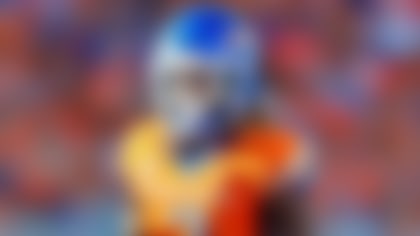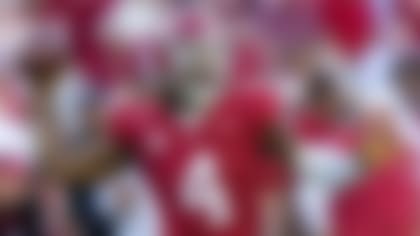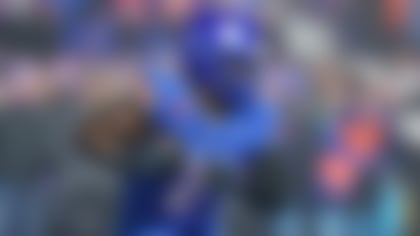If only Az Hakim held on to that punt ...
If only the Packers' wide receivers held on to anything ...
If only ...
The former Rams wideout's mishandling of a Saints punt sent the "Greatest Show on Turf" marching right out of the postseason, with St. Louis missing a chance to repeat as Super Bowl champs in 2000 after an unlikely title run in 1999. Aaron Rodgers' wide receivers couldn't catch passes, much less punts, in the 2011 Divisional Round against the Giants, and 15-1 Green Bay's presumed Super Bowl run ended three weeks before it was supposed to. Like the Rams in 2000, the 2011 Packers would not repeat.
More than that, these losses kept fans from possibly seeing incredible Super Bowl matchups. What if Kurt Warner, Marshall Faulk, Isaac Bruce and that prolific offense under Mike Martz had stood in for the Giants in Super Bowl XXXV? Besides being a much closer game than the one that New York ultimately lost to Baltimore, it would've featured the No. 1 offense (the Rams) in recent memory against the top defense of this century (the Ravens). Had Rodgers not been chucking and ducking amidst a fierce New York pass rush, and had his receivers caught the ball, the logline of Super XLVI might have been Rodgers-Brady I.
Looking back over 51 years of Super Bowls, the possibilities are endless. Just consider this year: What if Carson Wentz hadn't gotten hurt? How enticing would Super Bowl LII be? Maybe it will still be must-see TV, like when the Giants beat the Bills in Super Bowl XXV with backup quarterback Jeff Hostetler. That game was an all-timer, even if fans did miss out on watching Buffalo's no-huddle offense try to keep up with Joe Montana, Jerry Rice and the Niners running the West Coast offense at its zenith. What a matchup that would've been.
Not good enough to be the greatest Super Bowl matchup that never happened, though. Below are the top 10 dream Super Bowls the world missed out on, based on a variety of factors -- I looked at top seeds that were knocked off prematurely, cool storylines and once-in-a-lifetime matchups that never came to pass, like QB13 vs. the 46. Tell you what, we'll get to that one. Let's start around Y2K, when that aforementioned muffed punt meant the Ravens caught a lucky bounce. Well, unless you're a Kerry Collins guy.
10) Super Bowl XXXV (2000 season) should have been: Rams vs. Ravens
It's not often that you get the premier offense of the last 30 years versus the premier defense of the last 30 years. Yet, instead of seeing the "Greatest Show on Turf" versus the "Greatest Slow on Grass," we got Giants-Ravens. Ugh. Baltimore slowed up every offense it faced, allowing only 16 offensive points in four playoff games. This after giving up 10.3 points per outing during the regular season. The Ravens would've met their match in the Rams, who were in the middle of leading the NFL in scoring three straight years. Although in 2000, Trent Green filled in for an injured Kurt Warner part-time, and a paltry defense caused St. Louis to slip a little from its Super Bowl run the year before. The Rams still scored 540 points, 14 more than they did in '99. Kerry Collins, Tiki Barber and friends couldn't match those fireworks.
9) Super Bowl XVIII (1983 season) should have been: 49ers vs. Raiders
This is a fun matchup that never happened. Only three times have the two teams from the Bay Area been involved in their respective conference championships in the same season: 1970, 1983 and 1990. Of course, during the latter two seasons, the Silver and Black were stationed in Los Angeles. You might know that the '83 Raiders creamed the Redskins in Super Bowl XVIII. What you might not know is that the 49ers gave that Washington team all it could handle in the NFC Championship Game, coming back from a 21-nothing second-half deficit, only to fall just short of reaching the Super Bowl, with a final score of 24-21. What a matchup this would've been. Los Angeles featured a former Stanford quarterback in Jim Plunkett, ironically the college whose stadium was the site of San Francisco's Super Bowl win the following year. The 49ers' passing game versus corners Mike Haynes and Lester Hayes would've been awesome. Raiders owner Al Davis gave Bill Walsh, San Francisco's legendary head coach, his first job in pro football. Both teams developed Sid Gillman's West Coast offense, with Davis' team emphasizing the vertical side and heavy use of the tight end, while Walsh and quarterback Joe Montana mastered the short passing game to near perfection in the '80s.
8) Super Bowl I (1966 season) should have been: Chiefs vs. Cowboys
What would the first Super Bowl have been without Vince Lombardi's Packers? Closer, for one thing. And perhaps the Lombardi Trophy would now be referred to as the Landry Trophy. As in, Tom Landry, who coached the Cowboys for 29 years, starting in Dallas in 1960. You know who else began in Dallas in '60? The Texans, an AFL team that played there until owner Lamar Hunt moved his team to Kansas City and named them the Chiefs three years later. What if the first Super Bowl featured two franchises that fought for a smallish Texas city and realized they both couldn't survive? Not to mention, the two most innovative coaches in pro football were the Chiefs' Hank Stram and the Cowboys' Landry. Both men were their own offensive coordinator and defensive coordinator. Landry developed the 4-3 defense in the mid-1950s, while Stram pioneered the use of a nose tackle in early renditions of the 3-4. This imaginary matchup would have provided a glimpse into pro football's future -- and a better outcome than 35-10.
7) Super Bowl XXIX (1994 season) should have been: Chiefs vs. 49ers
Of all the teams included in these what-if scenarios, the 1994 Chiefs were bounced from the playoffs the earliest, bowing out in the Wild Card Round in Miami. It was also, sadly, Joe Montana's last professional football game. What makes this imaginary Super Bowl matchup special? A) Knowing how bad the real Super Bowl was, and B) knowing how sexy it would've been had Montana faced his former team -- and caddy -- in a game he'd owned four times before. Montana's divorce from the 49ers was a little messy, made more bitter by the organization moving forward with Steve Young, who couldn't get the Niners past the NFC Championship Game in 1992 or '93. Rumors of the sour relationship between Montana and Young (perhaps overblown) charged an electric atmosphere at Arrowhead Stadium in the Niners' and Chiefs' regular-season meeting in 1994, with San Francisco falling to Kansas City as Montana outplayed his successor. The only bigger game all year was when the 49ers played the Cowboys in the NFC title match. While the Chargers wound up functioning as the AFC's sacrificial lamb in the Super Bowl, Montana and his 4-0 Super Sunday record would have been far more daunting for San Francisco or Dallas. Not to mention, seeing Derrick Thomas chase Young all over the ballpark would've been cool, too.
6) Super Bowl XII (1977 season) should have been: Cowboys vs. Raiders
No two organizations had longer bouts of success than the Cowboys and Raiders from the mid-1960s to the mid-1980s. How's this for a catalogue? From 1965 to 1985, Oakland sustained one losing season. Total. (They went a middling 7-9 in 1981.) Dallas started a unique streak of its own in 1966, going 20 straight seasons without a losing campaign. During this incredibly prolific window, the two franchises combined for nineSuper Bowl berths and 23 championship-game appearances. Six times, the Cowboys and Raiders played in the championship games of their respective conferences/leagues in the same year (1967, 1970, 1973, 1975, 1977 and 1980) -- but not once did they both advance. 1977 would have been the year for it to happen. Oakland had just won it all for the first time under John Madden's stewardship the year prior, romping through that '76 season to a 13-1 record before dominating the Vikings in Super Bowl XI. Oakland followed up by going 11-3 in '77, while Dallas was the top team in the league at 12-2. Madden's outcasts and partiers were everything the buttoned-up Cowboys weren't, at least in the public eye. However much milk quarterback Roger Staubach drank, Stabler matched him in bourbon. Dallas was corporate, Oakland went mullet. One was silver and royal blue, the other silver and pirate black. They truly were studies in contrast ... and greatness.
5) Super Bowl XLIV (2009 season) should have been: Vikings vs. Colts
Who wouldn't have wanted to see Brett Favre and Peyton Manning go toe-to-toe on the NFL's biggest stage? Sure, it's low-hanging fruit. But real Super Bowls have included the likes of Len Dawson facing Bart Starr, and Terry Bradshaw fighting Roger Staubach over two Lombardi trophies -- even Dan Marino and Joe Montana went toe-to-toe, er, arm-to-arm. Oh, and don't sleep on Favre-Elway or Warner-Brady. So lamenting the fact that the football universe is devoid of a showdown of Favrian proportions (or Manningian, depending on your leaning) is OK, and not merely a stock complaint. The 2009 season featured an MVP effort from Manning, who guided the Colts to the top seed in the AFC. For all of Favre's exploits -- including three MVPs of his own -- this particular season might have been his best. At 40 years old and playing his first season with the Vikings, he set career highs in completion percentage (68.4) and yards per attempt (7.9), in addition to posting a career low in interception percentage (1.3). Not to mention the hype that would have been built up around the Vikings playing in their first Super Bowl since January 1977.
4) Super Bowl XXV (1990 season) should have been: 49ers vs. Bills
In fairness, Super Bowl XXV was a fantastic game. Yet, the high-powered no-huddle Bills facing off against the timing-based-to-perfection system the 49ers employed would have resulted in a shootout to remember. And not because of rules that had been geared toward the offense or shoddy defense -- rather, because these teams were well-oiled machines that featured high-level quarterback play, running backs who could make hay in the passing game and outstanding wide receivers. Think of some of the names in that regard: Jim Kelly and Joe Montana (if he could've played). Thurman Thomas and the Roger Craig/Tom Rathman tandem. And those receivers -- talk about unbelievable talent. For San Francisco, Hall of Famer Jerry Rice would have paired with one of the better WR2s in recent memory, big-play John Taylor, while two more Hall of Fame receivers (Andre Reed and James Lofton) would have been working for Buffalo on the other side. Because of the matchups and the fact that the Niners didn't employ a defense as stout as that of the Giants (whom Buffalo ultimately lost to in the Super Bowl), the Bills probably would have had a better chance to win their first title. Meanwhile, the 49ers would have been going for a three-peat. Not bad.
3) Super Bowl XLVI (2011 season) should have been: Packers vs. Patriots
With Tom Brady's career appearing to slow down (kind of), it seems less and less likely we'll get to see Brady take on Aaron Rodgers in the most important game in professional sports. (They've only linked up once to date, in a stellar late-season game at Lambeau in 2014.) That said, 2011 would've been a perfect time for these teams to meet with their Hall of Fame quarterbacks leading the way. In fact, the Packers almost were perfect that year, going 15-1 behind an incredible MVP season from Rodgers (45 touchdowns, six interceptions). Brady posted a similarly effective performance in his own MVP-winning campaign the year prior (36 touchdowns, four interceptions), helping the Patriots capture the top seed -- only to get bounced in the Divisional Round by the Jets. So in 2011, New England was as motivated as ever to go further. The Pats did, but the Packers couldn't. Pressure from the Giants' front and a few key drops derailed Green Bay's Lombardi run before it ever got started, really, with New York stopping the Packers in the Divisional Round. Thus, we weren't able to see the top-shelf teams in each conference square off in Super Bowl XLVI.
Oh well -- Rodgers has a few more years left, and with the way Brady performed in 2017, maybe he does, too. Either way, Green Bay-New England could've been a matchup made in Cheesehead heaven. And if, say, Jordy Nelson had followed in the infamous footsteps of a Packers legend by managing to catch two touchdowns while dealing with a hangover after not sleeping all night? Even better.
2) Super Bowl XX (1985 season) should have been: Dolphins vs. Bears
The Dolphins facing the Bears in the NFL's biggest game after the 1985 season would have sparked the most entertaining buildup to a Super Bowl ever, perhaps surpassed only by the fervor that our top dream matchup would have inspired. In a now-famous "Monday Night Football" game in 1985, Miami throttled the then-undefeated 46 defense, ending 12-0 Chicago's hopes of becoming only the second team to go without a loss all year. Pointedly, and certainly not coincidentally, members of the 1972 Dolphins -- the first team to go without a loss all year -- were on the sidelines to take in Dan Marino unleashing pass after pass before the Bears' pass rush could get home. His uncanny ability to I.D. the defense and release the football, particularly as a younger player, might have been the kryptonite for one of the strongest defenses in league history. Or perhaps Miami's 38-24 win was an anomaly; maybe the Dolphins just caught Chicago on an off night. We'll never know. Because the pesky Patriots (no, not those Patriots) knocked off the Dolphins in the AFC Championship Game.
1) Super Bowl XXXIII (1998 season) should have been: Vikings vs. Broncos
This is the Super Bowl we were all robbed of ... thank you, Morten Andersen, for making the kick that sent the Falcons to Miami. Of course, it was Vikings kicker Gary Anderson who missed a key field-goal try that would've given that 15-1 Minnesota team a nearly insurmountable 10-point lead late in the fourth quarter at home. So instead of seeing what was at the time the highest-scoring offense in the history of the league go up against the 14-2 Broncos, we lived through Falcons-coach-Dan-Reeves-versus-his-former-team and Reeves-versus-his-former-employee features all week. No one cared.
The greatness of Broncos coach Mike Shanahan aside, all anyone wanted was to watch Vikings quarterback Randall Cunningham, receiver Cris Carter and a dynamic rookie named Randy Moss try to put up enough points to spoil Denver's attempt to repeat after winning Super Bowl XXXII. As prolific as Dennis Green's Minnesota offense was (Brian Billick was the OC), the Broncos would've gone right at them with league MVP Terrell Davis, running through enough clock to limit possessions in the greatest Super Bowl that never was. Worth noting is that Denver's offense that season was No. 2 in scoring, behind the Vikings. With both teams so evenly matched, resulting in more weighty, important drives, Minnesota-Denver could've rivaled any Super Bowl in history. Only once (Super Bowl XIX, between the 15-1 Niners and 14-2 Dolphins) have two teams with such strong records faced each other on Super Sunday. Not to mention what a tough game this would've been to pick: Would John Elway still have walked off into the sunset a winner? Or would we all have had reason to view Cunningham's career differently?
Follow Elliot Harrison on Twitter @HarrisonNFL.












